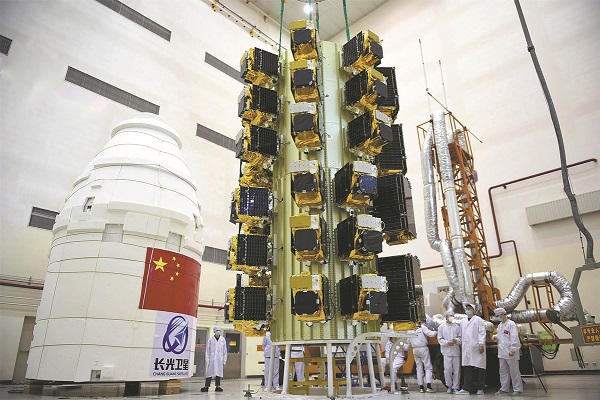
A total of 41 satellites are placed inside a Long March 2D carrier rocket before their launch in Taiyuan, Shanxi province. CHINA DAILY
New power
Private enterprises have become a new power in China's rocket industry, with their growth being fast-tracked.
Last year, when the nation carried out 67 rocket launches, 12 rockets built by Chinese private companies were used to send satellites into space, far more than in previous years.
In April, the first TL 2 rocket, developed by the startup Space Pioneer, which is based in Beijing, reached orbit on its maiden flight, becoming the first privately built, liquid-fuel rocket in China to do so.
Lifting off from the Jiuquan Satellite Launch Center in northwestern China, it placed a remote-sensing satellite in a sun-synchronous orbit about 500 kilometers above the Earth.
It was the first time any privately developed, liquid-propellant carrier rocket in the world had succeeded in its first orbital attempt — a powered flight that places a craft in orbit in outer space.
Before the TL 2, all liquid-propellant rockets developed by private enterprises, including SpaceX and Virgin Orbit in the United States and China's LandSpace, failed on their first orbital attempt.
The successful launch also saw Space Pioneer become the third private company in China to carry out an orbital mission.
Previously, i-Space and Galactic Energy, which are both based in Beijing, achieved the feat using their own solid-propellant rockets. Such rockets are easier to design and make than liquid-fuel rockets, but their smaller capacity means they cannot launch large satellites or deploy spacecraft to high orbits.
Wang Yanan, editor-in-chief of Aerospace Knowledge magazine, said the TL 2's success is a milestone for China's space industry, as it shows that the nation's private players have grown strong enough to undertake important tasks previously only conducted by State-owned giants.